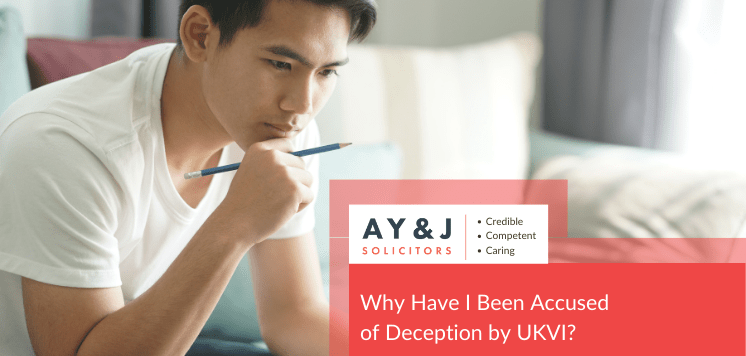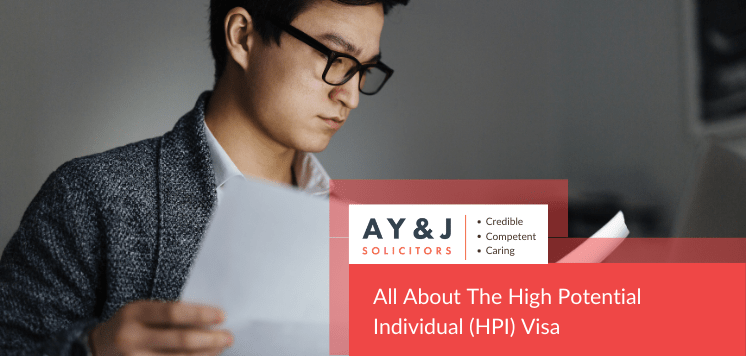Disclaimer: The information in this blog is accurate as of its publication date. Any updates after that date are not reflected here.
If you have been advised by UK Visas and Immigration (UKVI) that your visa application has been refused or your leave has been cancelled due to deception, you may be able to challenge the decision by appealing on human rights grounds or by way of a judicial review. This may happen even if you make a genuine mistake on a visa application which the Home Office believe to be a deliberate attempt to mislead them. The impact of being accused of deception can be considerable as it may result in your visa being refused, your leave being cancelled, and future immigration applications being refused. In this article, we will discuss why UKVI may cancel your leave or refuse your immigration application on the basis of deception.
What does UKVI mean by ‘deception’?
Deception in the context of the immigration rules refers to providing false representations, false documents, and/or false information. The rules state that deception may occur if false representations have been made or false documents or information have been provided:
- whether or not it is material to the application
- whether or not it was to the applicant’s knowledge, or
- if material facts have not been disclosed – i.e. you did not mention a previous visa refusal on your application or a prior criminal conviction
How does UKVI consider common reasons for deception?
The UKVI case officers have to follow strict guidelines when it comes to deciding how to handle cases of alleged deception. In some cases, it may be a mandatory requirement to refuse an application or cancel leave. However, in other scenarios, this may be left to the discretion of the case officer. The accusation of deception can be made for the below typical situations.
False Representations
Notably, one of the main ways in which people get accused of deceit is through the failure to state facts that are truthfully known. This means giving fake information or poor information about you when applying for a visa. It could be regarding your identity, job history or any other document that the UKVI may deem relevant.
Providing False Documents
Another typical cause for deception accusations is attaching forged or modified documents. These could be fake bank statements, employment letters or any other required documents. The UKVI is very rigid in ensuring that they identity any fake documents.
Failure to Disclose Relevant Information
Failing to include all the relevant information can lead to allegations of deception. You must be very upfront about immigration and personal history and disclose all the necessary information. Any omissions or inaccuracies can be seen as an attempt to deceive the UKVI.
Criminal Convictions
The applicants are quite often prone to misunderstanding the notion of what a criminal conviction is. So this can result in non-disclosure and visa refusal eventually. Even a minor offence like a driving violation should be disclosed.
Immigration History
Inaccurate disclosures regarding previous UK visa refusals or immigration history may lead to complications, even if the inaccuracies were not intentional. For instance, failing to mention a previous visa refusal can result in an accusation of deception.
Alleged False Documents
An accusation can also be made due to misunderstandings. An applicant may present an authentic document but it can be wrongfully ruled as a false document by a Home Office official because of poor verification measures.
Burden of proof for deception accusation
If the Home Office allege that you have made a false representation in your current or a prior immigration application, the burden of proof is on them to prove that a) the representations are not true and b) there has been dishonesty or deception. Deception or dishonesty must be proven by the Home Office on the ‘balance of probabilities’; in other words, that the applicant (or a third party) “deliberately and dishonestly made false representations, submitted false documents or information or failed to disclose material facts”.
Innocent mistakes vs deception
The Home Office guidance reminds case officers that providing false information will not always be viewed as an attempt to deceive; “There is a distinction between information that is false but where you are not satisfied there was an intention to deceive by the applicant and cases where you are satisfied there was deception by the applicant”.
The guidance further clarifies that case officers must not refuse an application if an innocent mistake has been made or if there are “minor but immaterial inaccuracies”. Examples of immaterial inaccuracies might include accidentally mixing up the date/month on a date of birth or putting an incorrect letter or number in a postcode. Visa criteria will also be relevant in such cases. The Home Office guidance provides an example of a visa applicant who claims that they have an income of £40,000 but have provided evidence for £4,000. Here a case officer may consider that the higher figure of £40,000 is a genuine error but would still need to issue a refusal as the applicant does not meet the income requirement for their visa.
When determining whether to refuse an application on the basis of deception if they spot a mistake, case officers will take into account factors such as:
- how easy it was to make an innocent mistake on the application
- how likely it was that the applicant would have been unaware that the information has been provided was false
- whether the mistake benefits the applicant
- whether the applicant has made the same mistakes on a previous application form.
What if a third party made a false representation?
If UKVI is satisfied that a false representation was made by a third party (e.g. by the applicant’s partner or family member), they may decide not to refuse an application on suitability grounds. This is most likely if it is clear that the false representation was not relevant to the outcome of the application. In such cases, UKVI will consider:
- whether the applicant should have known the information was false
- whether it was reasonable of the applicant to declare the information was accurate without checking it first
- the impact of the refusal on the applicant and if the outcome is reasonable in all the circumstances of the case
How to avoid an accusation of deception
The best strategy when it comes to the Home Office’s policy on deception and false representation is to prepare your application properly in the first place. This can be achieved by:
- Taking your time when preparing your application
- Reviewing your completed application form several times before it is submitted
- Treat the sections of your application forms as carefully as you can, and always cross-check the information provided.
- Only ever instructing an immigration Solicitor you can trust to handle your matter on your behalf
- Disclosing any prior criminal convictions or breaches of the immigration rules – if you are unsure of what you should disclose, speak to an immigration Solicitor. Don’t be tempted to simply omit information because you think it may lead to a refusal, as you risk being accused of deception, and
- Being honest at all times.
Final words
If you have been accused of deception by UKVI, it is important to seek the advice of an immigration Solicitor as soon as possible. They will be able to determine if the UKVI have proper legal grounds for refusing your application or cancelling your leave due to alleged deception and recommend the most appropriate action to protect your immigration status and that of your family members.
A Y & J Solicitors is a specialist immigration law firm with extensive experience with all types of visa applications. We have an in-depth understanding of immigration law and are professional and results-focused. For assistance with your application or any other UK immigration law concerns, please contact us on +44 20 7404 7933 or at contact us today. We’re here to help!








